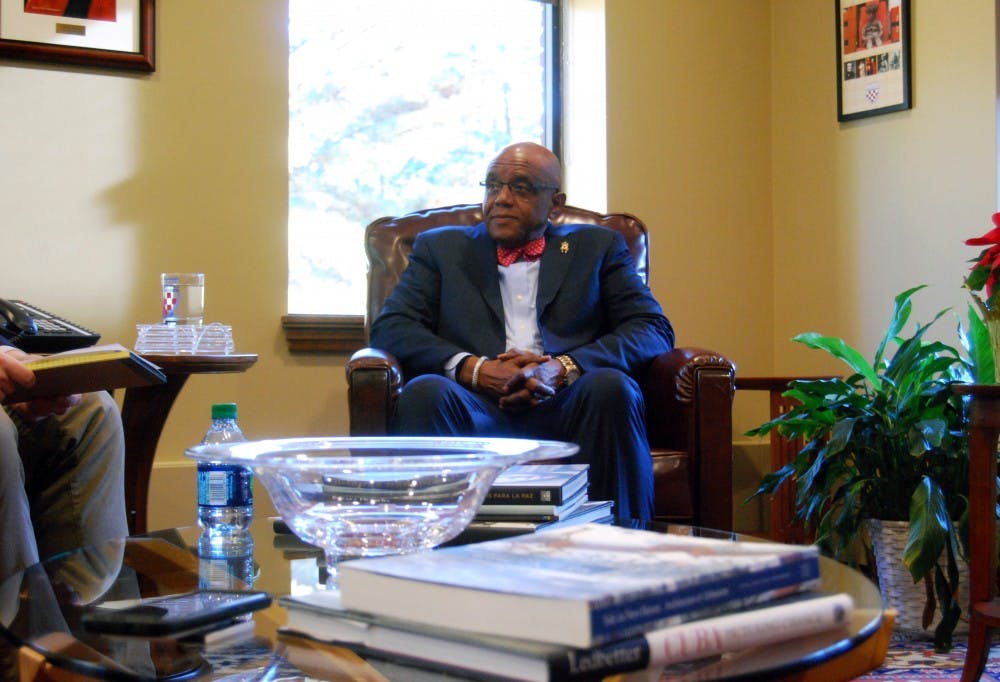University of Richmond President Ronald Crutcher, Executive Vice President and Chief Operating Officer David Hale and Executive Vice President and Provost Jeffrey Legro will take a 10% salary reduction for the 2021 fiscal year, according to an April 9 email Hale and Legro sent to faculty and staff that was obtained by The Collegian.
Hale and Legro wrote they were expecting a shortfall in the range of $10 million to $12 million in UR's 2021 fiscal year budget. This shortfall will come from the unpredictable impact of COVID-19 on enrollment, a decrease in expected spending from the endowment and an anticipated increase in financial aid for UR students, they wrote.
Additionally, all vice presidents and academic deans agreed to take a 5% salary reduction, Hale and Legro wrote. UR leadership wanted to personally contribute to the expenditure reduction UR needs for the 2021 fiscal year, which runs July 1, 2020, to June 30, 2021, Hale said.
Patrice Rankine, dean of the School of Arts and Sciences, wrote in an email to The Collegian that faculty and staff members who took salary reductions understood that UR was not immune to the impact of the downturn in the economy resulting from COVID-19.
"The decision to take a salary reduction was one of those simultaneous, voluntary, and clear acts of human good will," Rankine wrote. "When the deans met with the provost, who is our immediate boss, we began to offer how we might be able to help. Little did we know that the President and his cabinet had also been talking about themselves taking voluntary reductions."
We are seeing across the country and world that many people in leadership positions are not only aware of how complex a situation COVID-19 is, economically, socially and in every other way, but we also want to meet that complexity with tangible action."
Crutcher discussed the financial sustainability of UR in a Faculty Senate meeting on April 24 and said Athletics leadership also took salary reductions.
"The highest-paid coaches and the vice president and head of athletics have taken salary decreases as well," Crutcher said.
According to the Return of Organization Exempt From Income Tax (Form 990) for the fiscal year ending June 2018, Crutcher made $809,587, Hale made $488,300 and Legro made $204,265. These salaries include base compensation, bonus and incentive compensation, other reportable compensation, retirement and other deferred compensation and nontaxable benefits. These numbers may not be reflective of current 2020 salaries.
Crutcher did not specify which coaches would take salary decreases.
"As we look to create a budget for the upcoming academic year, we are facing the reality of much lower revenues than we had been previously budgeting or anticipating," Hale said.
Although UR leadership was considering a freeze to employee salaries in the 2021 fiscal year, Crutcher came up with the idea to go beyond the freeze and have the leadership team take a reduction in their salaries to further contribute to UR's reduction of expenditures, Hale said.
Enjoy what you're reading?
Signup for our newsletter
Hale and Legro wrote in their April 9 email that the salary freeze was necessary but that they regretted the impact the decision would have on UR faculty and staff and their families considering the extraordinary challenges COVID-19 presented.
In the email, Hale and Legro identified four actions UR leadership would take to address its budget challenges because of the COVID-19 pandemic: freezing all employees' salaries at their current amounts, implementing a hiring freeze, delaying small capital projects and conducting budget reductions from each division and each school.
"[These steps] really try to boost the university through this crisis in the least disruptive way as possible," Hale said. "Now, it's not to say that these changes that we are asking the community to take are not disruptive, but we felt that these were the appropriate steps to take at this time knowing what we know at this moment during this unprecedented crisis.
"All vice presidents and all academic deans, when we discussed this idea, volunteered to go ahead and take these reductions. We have seen this at a few other institutions, we're not really tracking that, but it was really a leadership idea by President Crutcher that we all supported and wanted to participate in, so that's why we decided to do it."
UR has incurred significant expenses this spring in responding to the pandemic, putting significant pressure on the 2020 fiscal year budget, Hale and Legro wrote. Most UR employees will be compensated based on their regularly scheduled hours even if their schedules have been reduced, they wrote.
Hale and Legro wrote that although UR could likely avoid a budget deficit for the 2020 fiscal year, the operating budget for the 2021 fiscal year would face a financial downturn caused by the COVID-19 pandemic.
"Our contribution to our budget from the endowment will remain level for the next year," Crutcher said.
The 2021 fiscal year budget will continue to develop depending on the duration of COVID-19's effects on UR operations, which is unknown at the time, Hale and Legro wrote.
Contact news writer Morgan Howland at morgan.howland@richmond.edu.
Support independent student media
You can make a tax-deductible donation by clicking the button below, which takes you to our secure PayPal account. The page is set up to receive contributions in whatever amount you designate. We look forward to using the money we raise to further our mission of providing honest and accurate information to students, faculty, staff, alumni and others in the general public.
Donate Now



